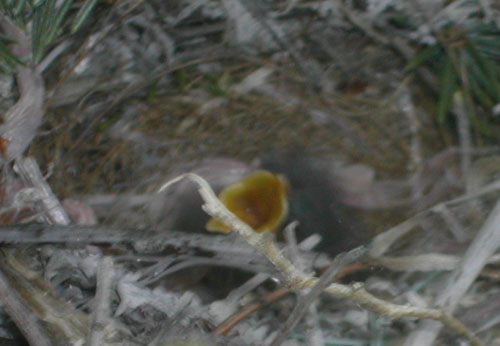The choice in question was whether to try to relocate a nest full of eggs in a tree whose number is almost up. With your help, we decided against relocation. Moreover, we’re ready to delay removal of the tree as long as might be necessary until the nest is vacant.
Today’s developments documented below the fold.
Keep in mind that these pictures were taken from higher on the ladder than one is officially supposed to stand, with the needles of the tree digging into my flesh as I held the branches back to get a good shot. (Also, raising hives; my pine allergy strikes again.) So yeah, I know the focus isn’t great.

Look, a beak! This baby bird seemed to want to be fed, but I had neither insects nor pre-chewed worms to offer. I trust that Mama bird took care of it once I got out of her yard.

There are at least two, and possibly three, hatchlings in this huddle. (I only ever saw two open beaks at a time, so it’s possible there’s still an unhatched egg in there somewhere.) These critters clearly aren’t ready to fend for themselves yet, but in just a couple weeks they’ll be ready to fledge.
We’re feeling good about this choice, and it has required much less patience than we anticipated it might. Thanks again for your collective wisdom.

Excellent! Soon the fledglings will be following their parents all over your back yard begging for food. We’ve got a couple different mockingbird families in our back yard. Our neighbors have a gazillion bird feeders, and the baby will perch right on the feeder, chirping for food. The parent then has to grab the food from the feeder and place it directly in the baby’s mouth.
Nobody ever gave mockingbirds a medal for intelligence, that’s for sure.
Any ID on the species. If it is a mockingbird, I am sure you know that at least in the South there is a cultural disinclination to harm them, although I have been known to loft a rock at a particulary aggressive one. Just venting; no chance of hitting anything.
A bit off topic, but perhaps one of you can answer, or point me in the right direction. We have a Sage sparrow that built a nest in the monastery, and Bro. Juniper questioned how “innate” or “instinct” or “inborn” skills, such as nest building, first get into the DNA code. We note that the fledgling sparrow isn’t “taught” nest building, yet upon maturity they masterfully do build nests.
Shalom,
Bro. Bartleby
Bro. Bartleby. The answer is simple if you are a knee-jerk Darwinist. Down through the eons of history the offspring of the birds who by random chance laid their eggs in a protective spot probably in a cache of food (those who had survived on the basis of food storage), a “nest” if you will, survived and those who randomly laid them in the open did not.
Now that is a very perceptive product of intellect that has survival potential that must have come from many years of Darwinian selection on the part of Bro. Juniper’s ancestors. But, alas, will he have the opportunity to pass that on to progeny, or will it dead-end in the monastery like the intellect of the Western world during what’s called the Dark Ages of our world’s history.